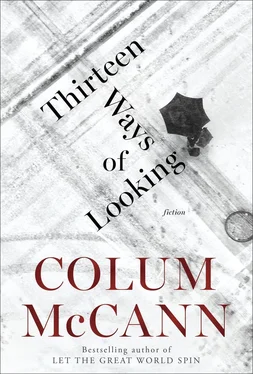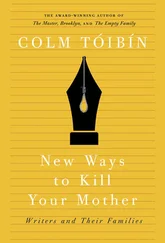Out in the morning, he would run full tilt towards the canal. There were two gorgeous swans that twined their necks around one another. In the afternoons his mother took him for walks along the grassy banks where he was allowed to strip down to his undershorts and jump in, pale and skinny, with the other boys. For some reason he could never work out, he was called Quinn and then, after a while, Quinner. Maybe he looked like a boy of that same name, or perhaps there was a Dublin slang in it he didn’t recognize, but he loved it, especially given the fact that a Q did not exist in his language. Quinner! Hey, Quinner! He wrote his nickname out elaborately in lined copybooks. Even his teachers latched on to the name, and when he handed in assignments he wrote Peter J. Quinn Mendelssohn.
Oh, it takes a lot of volume to fill a life. So said Boris Pasternak. Or at least I think it’s Pasternak. Eileen would know. She used to read it aloud to me at night. The roof over our love has been torn off and is open now to the endless sky.
In Dublin one of his school reports had said that he had a youthful bent towards philosophical inquiry. A youthful bent! Philosophical inquiry! Eleven years old! Surely only the Jesuits were capable of a phrase like that. They saw great promise in him. Overlooked his background, slipped him books of Catholic substance. He walked home along the canals with Aquinas rattling around in his head. But on summer afternoons all he wanted to do was to jump off the dark canal locks, holding his knees to cannonball into the water. There was even a photograph taken of him on June 15, 1944, published in The Irish Press, caught in mid-air, his whole body bundled, his ribs tight, his arms ropy, the length of the canal dark behind him, the sky above him white, a look of fierce concentration on his face. The caption read, simply, Boy above Canal . His mother bought all the copies she could find in the small shop on Baggot Street Bridge. They have yellowed and even disintegrated now, but not the memory: it was her next door, quite literally, in the very next house — and she came across and slipped the newspaper clipping under the door. He watched her from the bay window. Eileen Daly. Even then she was a beauty. Alabaster skin and a row of dainty freckles paintbrushed across her nose. So beautiful in fact that he never talked to her at all in those years. Not once. Not even a glancing hello or goodbye or how are you Eileen Daly, isn’t it a fine Dublin day? But he watched her from afar and she took his breath away. A hollowing-out of his stomach.
The day he left Dublin, oh, the day. It was bright and dappled, a surprise of sunshine. The hackney pulled up outside, a large silver car, an air horn on the side with a loud commanding blast. The bags were packed. The suitcases were loaded. He hid himself in the cupboard underneath the stairs. America. He didn’t want to go. Didn’t want to leave Ireland at all. But his father had a job offer. A letter had arrived. Elaborate handwriting. An eight-cent stamp with a picture of a twin-motored transport plane. An invitation, or maybe an accusation. Another continent. He was dragged out from underneath the stairs, shoved down the steps and into the waiting car. He glanced backwards through the rear window and there she was, Eileen Daly, all eleven years of her — or was she ten? — waving to him from the window of her living room. The white curtains bracketing her face. Her head slightly tilted. A few wisps of dark hair around her shoulders. Her lips pursed open ever so minutely, as if about to speak. He knew even then that he would see her this way forever, his mind had processed a photograph and seared itself on his brain. He wanted to turn to wave to her again, but the hackney had already reached the corner and he waved instead at a dirty brick wall.
Ireland.
Gone.
A chuisle mo chroí .
Whatever that means. Love of my heart or something like that. Bubbala, they might say in Yiddish. She had told him once and often, but it was a queer language, Irish, or Gaelic, he could never get the hang of it, it rolled marbles in his throat, the dún an doras, the má sé do thoil é, but the door was indeed shut, the sky went down and fell into the Irish Sea.
On the boat from Dun Laoghaire he heaved his guts up over the side and looked back towards the land until it became just the white of a wave. A miserable sunshine poured down upon him. He thought at least it could have had the dignity to rain one last time. Then, from Liverpool, they took off for America. The posh rooms. Port out, starboard home. He moped along the deck, Eileen Daly, Eileen Daly, Eileen Daly. Her name lay gentle on his tongue. He wasn’t allowed into the ship’s saloon, or even the library, but there was a billiard room by the first-class cabins where he sat in the corner and began writing her letters, his every waking moment consumed in the glance she gave him from the window. He couldn’t understand how he had never said a word to her: what was it that had paralyzed him? They had lived next door to each other for the best part of two years and now here he was writing her page after page, telling her about the sunsets over the water, and the odd way the lifeboats creaked, and his glance back to Ireland, everything and anything, he wrote at a furious pace, head down, fountain pen gliding over the paper, he had never written so much in his life, eleven years old — or was he twelve? — didn’t matter, he had the ancient disease, stupid, ridiculous, endless, it was his very first taste of what he would know later, intimately, wonderfully, the best of the four-letter words.
Eileen, I leaned, I lean.
Life is not so easy as to cross a field. Pasternak again. For sure this time, and oh, the mind is indeed a deep stone well, but how often a surprising bucket dips down into it and hits cool water. Eileen read the Russian poet’s books aloud many nights, with her Irish lilt and a blanket pulled up around her neck, soft wool, Avoca, where the rivers met, or so she told him. She was a fount of Irish knowledge, and Russian knowledge, and even Jewish knowledge at times, a Helicon indeed, with some Greek thrown in and a smidge of Latin. Thankfully she never had to see me in the diaper, the nappy, the winter gear, down by those Salley gardens my love and I did meet.
He tilts his coffee cup and sighs. Empty now, just a small rivulet making its way along the inside of the porcelain. All life slowed down to this. The drip. The drop. The snow white feet.
Slowly falling, falling slowly. Out the window now. Big white flurries against the glass. That was a story she loved so much too, snow general all over Ireland, Michael Furey singing at the window, poor Gabriel left alone, the descent of his last end.
He tilts the coffee cup one last time and allows the last drop to fall on the newspaper where he watches it slowly blot and spread. A bi gezunt, his mother would have said. She was always one for the ancient phrase. You have your health, what more do you want?
— Sally?
He can hear her now in the kitchen, the rattle-out of the dishwasher, the clank along the rollers. Why in the world she needs to run the dishwasher he’ll never know, it’s not as if I spoiled a hundred plates with marmalade and toast.
And what is it that he wanted to say to Sally anyway, so deep in thought was he, back in Ireland, the good years, why interrupt them now, except perhaps the memory is so raw, and snow is general all over Eighty-sixth Street, the half-living, and I think she died for love, Eileen, I think she died for love.
— Mr. J.?
— It’s snowing out there.
— Yes, Mr. J.
Looking at him now, expecting something else. Hardly enough to interrupt her from the dishwasher just to tell her what she already knows, the snow coming down like an argument for snow.
Читать дальше












